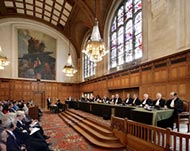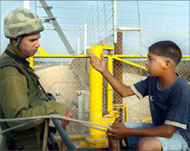Israel brushes aside World Court blow
Israeli officials have lashed out at the World Court after its damning indictment of the controversial West Bank barrier.

The judges who delivered the verdict on Friday were accused of “harbouring prejudice” against the Jewish state and ignoring “Palestinian terror” attacks on Israeli civilians.
Some Israeli leaders stopped just short of accusing the UN’s top court of “anti-Semitism”.
Israel‘s ambassador to the UN, Dan Gillerman, said in New York: “This is a dark day for the International Court of Justice and the international legal system.”
Yosef Lapid, Israel‘s justice minister, told the state-controlled radio on Saturday that Israel would not pay attention to the ruling of the Hague-based International Court of Justice (ICJ).
“We will heed the ruling of our supreme court, not the ruling of the ICJ,” he said, referring to the recent decision of Israel’s High Court of Justice ordering the government and the Israeli army to alter the course of the wall in order to minimise Palestinian hardship.
Political question
Israel‘s top court had ruled on a relatively small section of the elaborate network of fences, ditches and concrete wall that Israel says it is building to keep out Palestinian bombers but which Palestinians say has wreaked havoc on their lives and turned Arab population centres into virtual prison camps.
 |
|
Israel says ICJ has no authority |
By contrast, the 15-judge bench of the World Court ruled that the separation barrier was in breach of international law and called on Israel to tear it down in places where it encroaches on Palestinian territory and pay compensation for the damaged caused by its construction.
Furthermore, the judges said they couldn’t accept the Israeli and US arguments that the court had no jurisdiction to rule on the legality of the wall “because of the political character of the question posed”.
Be that as it may, Shlomo Avneri, professor of political science at the Hebrew University of Jerusalem, says the World Court‘s decision will have an impact only in the “PR sphere”.
“I don’t think it will have any impact in reality. The Arabs and others will make a big fanfare about it, but nothing will change on the ground,” he told Aljazeera.net.
Counter-productive?
Other Israeli analysts, notably Zeev Schiff, believe the ICJ ruling might even prompt Israel to accelerate the building of the barrier.
Schiff, who specialises in strategic affairs, says the wall has already proved its effectiveness in preventing Palestinian “terror”, thus vindicating its construction, notwithstanding Palestinian suffering and international objections.
|
“This is a dark day Dan Gillerman, |
However, the US might now pressure Israel to include the large Jewish settlement of Ariel in the heart of the West Bank within the wall, he says. “There is a sort of understanding between the Americans and the [Israeli] government that the wall shouldn’t engulf Ariel.”
But even such mild arm-twisting is doubtful considering that the Bush administration is facing a tough electoral battle in November and therefore unlikely to risk upsetting the powerful Jewish vote.
Indeed, Washington, which brushed aside the verdict saying the ICJ is not the forum for such a politicised issue, may yet foil the Palestinians’ next diplomatic move.
One of the options open to the Palestinian Authority is to take the ICJ’s ruling to the General Assembly with the backing of the UN’s Arab bloc, in the hope of pushing for the practical application of the court’s recommendation.
But Israeli Foreign Minister Silvan Shalom told state-run radio on Saturday that the Bush administration had already assured Israel that the US would veto any “anti-Israeli resolution” at the Security Council, and would also resist Arab efforts to mobilise the General Assembly to implement the World Court’s recommendation.
Fear of defeat
Israel’s hostile reaction to the ICJ ruling goes beyond the issue of the barrier. The Jewish state has consistently refused to subject its occupation of the West Bank, Gaza Strip and East Jerusalem to international judicial scrutiny.
 |
|
Increased judicial scrutiny of the |
Rather, successive Israeli governments have sought to make sure that the conflict with the Palestinians remains confined to the political sphere.
The logic is simple: As long as the conflict and its various aspects are contained within the political sphere, Israel has everything to gain due to the huge power imbalance between the two sides.
On the other hand, if the conflict ends up in the judicial domain, Israel stands to lose to the extent that right overrides might in the court of international public opinion.
This is why Israel has strenuously rejected attempts at international legal arbitration over the interpretation of UN Resolutions 242 and 338.
|
“I don’t think it will have any impact in reality. Shlomo Avneri, |
This is also the main reason Israel insists that the World Court is not the right forum to discuss “matters” between Israel and the Palestinians.
None the less, the ICJ ruling has dealt a severe blow to Israel, which has always sought to portray the West Bank, Gaza and East Jerusalem as “disputed” rather than “occupied” territories. The court reaffirmed forcefully the status of the territories as occupied and Israel as an occupying power.
It is a different matter that the decision may not have any impact on the ground, where Israeli bulldozers at work on the separation barrier continue to uproot and destroy Palestinian orchards, groves and vineyards, depriving numerous Arab families of their only source of livelihood and inflaming sentiments in an already tense wider neighbourhood.